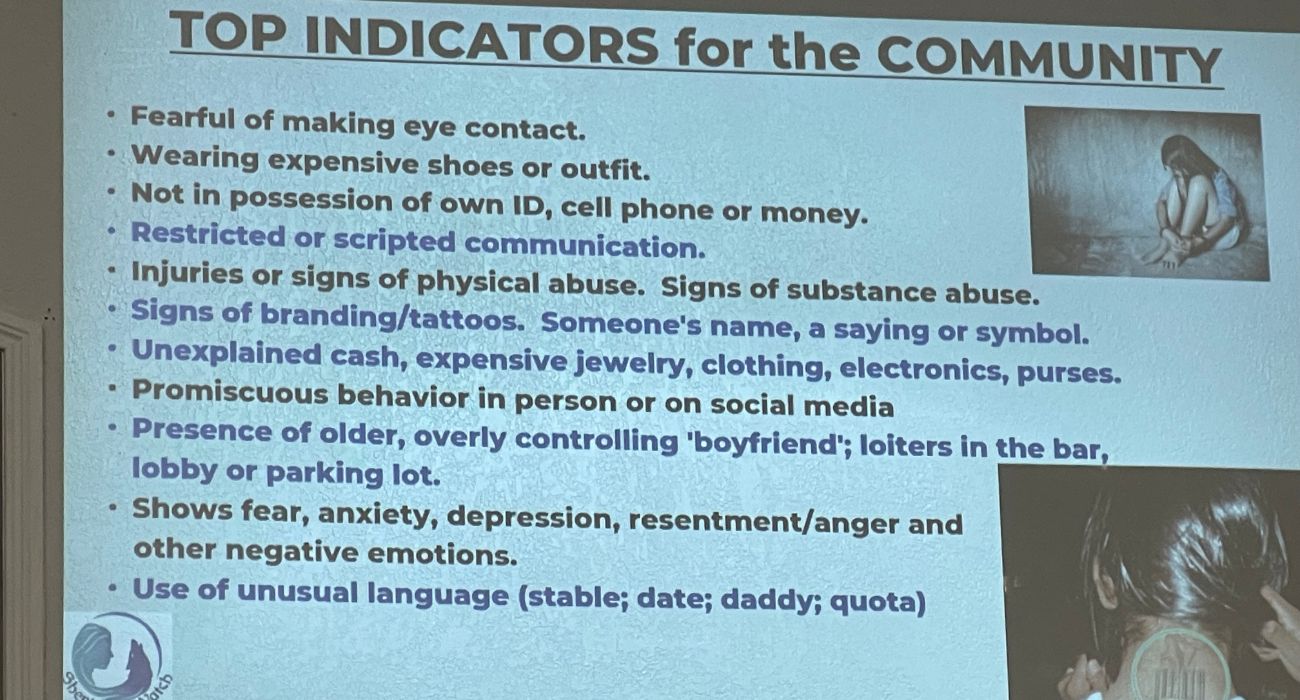Dozens gathered at Solid Rock Pentecostal Church in Bonham this week to learn about sex trafficking prevention.
“If you have seen cars on the road, you have seen sex trafficking in Texas,” Ben Hendley, community outreach director of Shepherd’s Watch, told The Dallas Express before the March 26 event. Shepherd’s Watch is a civilian volunteer non-profit investigative intelligence organization that is simultaneously trying to raise awareness of sex trafficking in the United States and help police bring traffickers to justice.
Its primary focus is on sex slavery, which usually involves the forcible use of adult women and children for sexual purposes. The group does not use its resources to pursue voluntary acts of prostitution involving consenting adults choosing to work in an illicit industry.
The image of prostitution is changing, Hendley said, adding, “It is no longer in the room above the saloon.”
The Shepherd’s Watch representative reported that sex trafficking is often found at businesses with a permanent physical address, such as illicit massage businesses and illegal brothels.
However, this is only one sector where the team’s investigators have detected trafficking activity. Shepherds Watch told Bonham community members that the internet has given sex trafficking more flexibility to eschew a permanent physical address and reach more clientele.
Facebook Marketplace is one of many social media forums where trafficking is advertised. Often, the trafficking listings use strategic ad placement or thinly veiled innuendo to signal that their services are sexual in nature.
Listings are often placed under advertisements oriented toward men, like men’s clothing, and at one time, “depression treatment” was a common code word signifying sexual services. The listings usually have a young woman in the photo and, on occasion, deploy overtly sexual suggestions.
Not all demographics are trafficked equally, and the demographics have been shifting over time.
Although a person of any age, race, and gender can be a victim of sex trafficking, the investigators found that Hispanic women are the most frequently trafficked. Shepherd’s Watch drew a direct connection to the insecure southern border as a reason for the increase in Hispanic sex trafficking victims.
As previously reported by The Dallas Express, Hispanic and black individuals — mostly women and girls — comprise the overwhelming majority of sex trafficking victims in Dallas proper, where a longstanding officer shortage has hampered the Dallas Police Department’s efforts to get crime under control in the city.
Stacey Montgomery, the president of Shepherd’s Watch, provided a catalog of indicators that are common among sex trafficking victims. A lack of identification, scripted communication, physical injuries, and branding are among the most common.

Images presented along with the catalog showed that traffickers would sometimes mark their victims with initials or barcodes on their necks to indicate ownership. Similarly, traffickers will sometimes tattoo themselves with explicit images of children to signify their work in the industry.
Traffickers also use unique code language. They are known to refer to their stock of sex slaves (usually about 5-15) as a “stable,” a sexual encounter as a “date,” pimps as “daddy/daddies,” and “quota[s]” as the number of times a sex slave must perform commercial sex services per day.
The typical sex slave in the United States services 10 clients a day, the organization’s representative told the audience.
The fight against sex trafficking faces numerous challenges, Montgomery said. Although Shepherd’s Watch is not a political organization, many problems it has identified purportedly have political origins.
The border crisis has allowed both sex slaves and cartel traffickers to enter the United States, and the ‘Defund the Police’ movement that swept through the political realm in 2020 deprived many police departments in Texas of the resources to investigate trafficking crimes.
At present, for example, DPD only fields around 3,000 sworn personnel. According to a City report, a jurisdiction the size of Dallas needs approximately 4,000 officers. Budgeting only around $654 million for DPD this fiscal year, the Dallas City Council chose to spend less taxpayer money on public safety than other high-crime jurisdictions, such as Chicago, Los Angeles, and New York City.
However, there are also structural issues that challenge the fight against sex trafficking. Public services, including the police and foster care services, are purportedly overwhelmed and unable to monitor suspected cases effectively. The flexibility that the internet affords traffickers also enables them to move across state lines to other police jurisdictions.
The speakers told the audience they had recently detected a trafficking ring that moved from Georgia to Midland, Texas. It is not known why the move occurred. However, investigators suspect it may have been done to avoid imminent action from local authorities back in Georgia.
Once inside the United States, victims can be trafficked through any mode of transportation. However, automobile transportation is the most common.
The speakers noted numerous structural flaws in the law that allow sex traffickers to avoid jail time. Hendley recalled at least one case where a trafficker had a chauffeur’s license, which allowed him to travel with multiple girls in the car without being stopped by police.
Montgomery also identified the high burden of proof that the law requires to pursue such cases as a barrier to handling them expeditiously. Although some police departments are very receptive to support from Shepherd’s Watch, some are reluctant to acknowledge any type of widespread crime problem. This, too, was cited as a reason for the lack of more aggressive action.
Several prominent community leaders were in the audience at the small country church. A local judge was in attendance, as was Fannin County Criminal District Attorney Richard E. Glaser.
“You bring me a case, and I’ll prosecute it,” Glaser told Shepherd’s Watch during the Q&A portion of the meeting.


